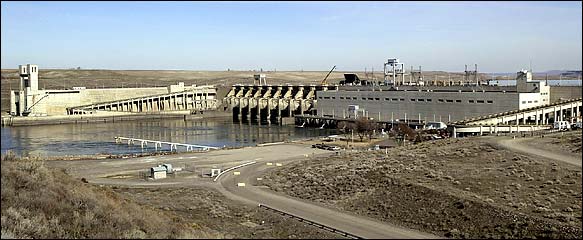forum
library
tutorial
contact

Obama's Salmon Plan Just
Repackages Bush's Failed Effort
by Glen SpainThe Register-Guard, October 17, 2009
|
the film forum library tutorial contact |

|
Obama's Salmon Plan Just
by Glen Spain |
 Unlike as optimistically characterized by Steve Wright, administrator of the Bonneville Power Administration, in his Oct. 10 guest viewpoint, "Right plan can save salmon and the hydroelectric dams," the Northwest's Columbia River salmon problems are far from over, and the battle to prevent their extinction is far from won.
Unlike as optimistically characterized by Steve Wright, administrator of the Bonneville Power Administration, in his Oct. 10 guest viewpoint, "Right plan can save salmon and the hydroelectric dams," the Northwest's Columbia River salmon problems are far from over, and the battle to prevent their extinction is far from won.
On Sept. 14, the Obama administration delivered its own much anticipated salmon strategy for the Columbia and Snake rivers. Unfortunately, after a four-month review, Obama's salmon team has merely adopted the previously rejected Bush administration salmon plan as its own, with only a few minor improvements.
Worst of all, the Bush-turned-Obama plan just embraces failed recovery goals of the past. Keeping expectations low, National Oceanic and Atmospheric Administration chief Jane Lubchenco assures us the plan will "prevent further declines." In other words, ratepayers and taxpayers all up and down the West Coast will remain on the hook for roughly $1 billion a year for at least the next 10 years to -- at best -- merely maintain Columbia Basin wild salmon at their already seriously imperiled levels.
In other words, like the Bush plan, the Obama strategy does not even aspire to actually rebuild the 13 threatened and endangered Columbia River salmon and steelhead populations to healthy and fishable levels. The new plan, like the old one, still leaves West Coast fishermen, and most of the West Coast salmon fishing industry, heading straight for the rocks. Talk about a "jobless recovery."
The Bush administration took special care to ignore and bury science. Unfortunately, the Obama administration's modified plan is little different -- it even rolls back the court-ordered protections such as "spill" that we fought hard to put into place, which BPA resisted, and which have since proven effective; it ignores the clear science of state, federal, and tribal fishery biologists; and it radically redefines the jeopardy standard of the Endangered Species Act -- weakening the core values of the law.
Wright also claims that this salmon plan is the work of unprecedented collaboration and has broad regional support. Then why were fishermen, whose jobs and communities are on the line, deliberately excluded? For an administration so set on protecting and restoring jobs, this status-quo plan is a huge mistake -- a death sentence for salmon and fishermen, not the road to recovery.
Attention has focused on long-term contingencies included in Obama's plan, particularly potential consideration of lower Snake River dam removal should populations truly fall off the cliff. At best, however, this would be many years down the road when the populations, already threatened and endangered, are even closer to extinction. And even then, they're just "planning to plan." It's like waiting to call the fire department until your house is already 80 percent burned. This gives no guarantee of life-saving help.
Wright's "green vs. dirty power" argument also simply does not hold water. There is no need to replace power from the four lower Snake River dams with the dirtiest possible power alternative. Many studies have shown how replacing hydropower from the dams with equally "green" power elsewhere would be both effective and far cheaper than building more coal plants.
The continued uncertainty that this decision perpetuates is bad for the Northwest, will delay progress, and will continue to destroy jobs and jeopardize salmon communities from southeast Alaska to Northern California.
Change in the Snake River may be expensive, but doing nothing has already been far more so. Already the Northwest salmon economy has lost more than 25,000 family-wage jobs, and at least $500 million every year, because of widespread salmon collapses in the Columbia Basin.
Even if, as Wright claims, it may cost as much as $500 million a year to replace the power from the Snake River dams, as compared with the approximately $1 billion a year it is going to cost us under the Obama plan to do little more than gold-plate the dams, with no assurance of recovery -- then the price for taking down the Snake River dams would be the best deal in town.
learn more on topics covered in the film
see the video
read the script
learn the songs
discussion forum
